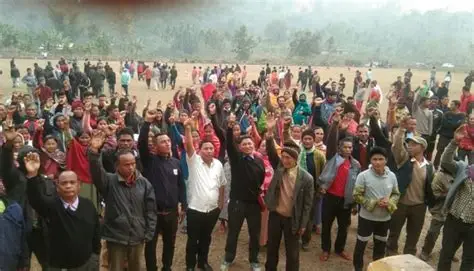Tribals fear mass displacement and loss of cultural identity from the Kulsi hydro project and Barduar township plan.
BY PC Bureau
Facing fierce tribal resistance, Assam Chief Minister Himanta Biswa Sarma on Sunday hinted at scrapping two more major development projects after announcing the relocation of a controversial Adani-backed thermal power plant from Kokrajhar.
Sarma is reported to have said that both the proposed 55-megawatt hydel project on the Kulsi River and a planned satellite township at Barduar—near Guwahati and bordering Meghalaya—may be shelved due to sustained indigenous opposition.
Speaking to the media persons during his visit to Dharapur, Sarma said, “If the people do not want the project to be carried out, they can simply file an application. What is the need for protests?” Sarma said.
The Kulsi project, a joint venture with Meghalaya, would involve dam construction in the river’s upper stretches, potentially displacing up to 10 villages. The Barduar township, meanwhile, planned on 1,500 acres around a British-era tea estate in Kamrup district, has raised fears of displacement among tribal families and sparked demands for land rights and Sixth Schedule protections.
“There are people who love protesting,” Sarma said, commenting on the backlash. “We—both CMs—want the dam to help with irrigation. If people don’t want it, they can say so. But instead, there are speeches, protests, new leaders—this is hurting Assam.” He emphasized that the government would not impose either project on unwilling communities.
The All Rabha Students’ Union and other tribal bodies are demanding land documents for long-time residents of Barduar, warning that the township would erode tribal identity and threaten their push for constitutional autonomy.
Tensions have been mounting over the Kulsi dam, with protests gaining momentum across the Assam-Meghalaya border. Indigenous communities—Rabha, Garo, Boro, Marak, and Khasi—have rejected the project, fearing it will devastate their forest-dependent livelihoods, homes, and a river many deem sacred.
READ: Kuki Rights Group Urges Halt to Tribal Land Encroachment
On last Friday, the Assam-Meghalaya Joint Resistance Committee held a meeting in Ukiam, chaired by activist Rajani Boro, to plan the next phase of the movement. Speakers criticized the lack of transparency and slammed political leaders for their absence.
Committee secretary Maniram Rabha said the dam could destroy ecosystems that have sustained generations. Others raised the region’s seismic risk—citing the 1897 Assam earthquake and the formation of Chandubi Lake—as a warning against such massive infrastructure.
Local tribal and environmental groups in Assam and Meghalaya are protesting a proposed 55 MW hydel project on the Kulsi River. They fear displacement, ecological damage—especially to endangered river dolphins—and cultural loss. Assam’s Chief Minister has said the plan will be… pic.twitter.com/ou74e4IhXn
— NewsX World (@NewsX) June 30, 2025
Nandalal Rabha stressed that only a united grassroots struggle could stop the dam. Albert Nonglai, who heads the Meghalaya unit of the committee, said a memorandum demanding the project’s cancellation would soon be submitted to CM Conrad Sangma.
Rajani Boro described the issue as not just ecological, but moral and existential: “The benefits will go to outsiders, the losses will be ours. The dam threatens our identity, our way of life.”
READ: ’Manipur: UKNA Claims Responsibility for Killing, Admits Executing Rival Rebel Leader
Meanwhile, the state government’s hint at relocating the 3,000-MW thermal power plant—initially slated for Kokrajhar—to alternative sites in Dhubri and Goalpara is being hailed as a major win for tribal resistance. The move follows weeks of protests by Bodo communities and groups like the Boro Diaspora Forum (BDF) and Indigenous Forum, Assam (IFA), who warned of large-scale deforestation and land alienation.
The Rs 40,000-crore project, a joint effort with the Adani Group, is now expected to lay its foundation by November 2025 and generate over one lakh direct and indirect jobs. It is being positioned as a game-changer for Assam’s energy infrastructure, akin to the Tata Group’s Rs 26,000-crore semiconductor plant in Jagiroad.














